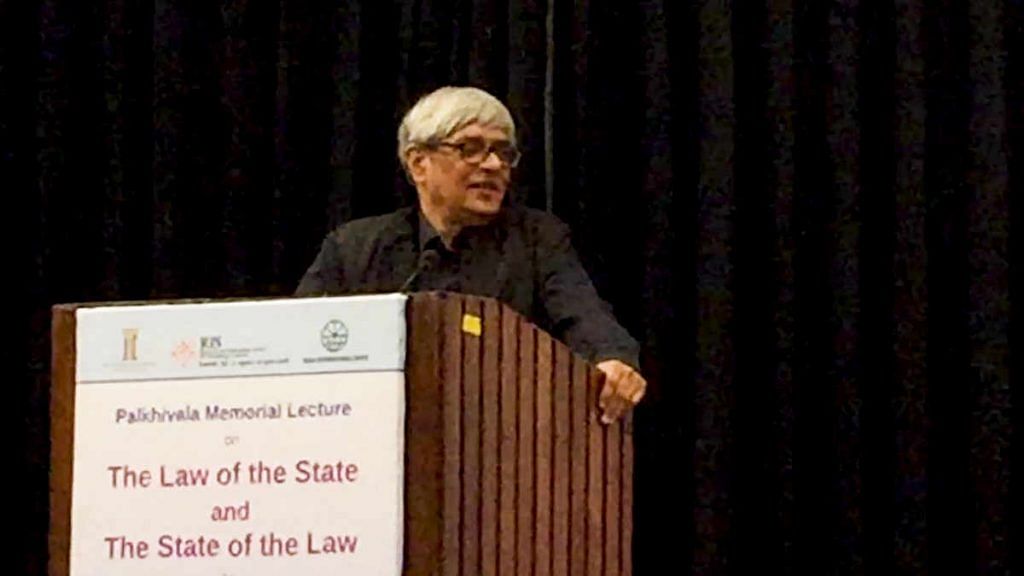New Delhi: Calling for a review of the Constitution of India, Bibek Debroy, chairman of the Economic Advisory Council (EAC) to the Prime Minister, said it will make the Constitution dynamic, reflecting the “altered realities” and “altered aspirations” for India “in 2047”.
“No Constitution should be cast in stone. It is meant to be dynamic and is supposed to reflect the will of the people through Parliament,” Debroy said in a signed article published in The New Indian Express Saturday.
He proposed a “subjective list” of nine “substantial changes” to the Constitution, raising questions about “socialism” as mentioned in the Preamble and the need for the Rajya Sabha.
“If we logically need a second chamber, why do some states function without legislative councils?” aske the EAC chairman.
Debroy also suggested the setting up of another State Reorganisation Commission, and a fresh definition of citizenship.
“This sounds like a laundry list for another Commission to review the Constitution, one with a report that is more than cosmetic and tinkering at the edges,” Debroy wrote, saying that a 2002 report of the National Commission to Review Working of the Constitution (NCRWC) only “tinkered at the edges and didn’t suggest anything substantial”.
ThePrint reached Debroy over phone, text and email, but did not receive a response till the publication of this report. The article will be updated once a response is received.
Referring to the Kesavananda Bharati judgment of 1973, which had declared that the Parliament could not change the basic or fundamental features of the Constitution, the EAC chairman wrote that the 13-member bench of the Supreme Court decided 7/6 in favour of the verdict.
“Had one judge given a different ruling, the outcome would have been different. Because of what one judge decided in 1973, an avowedly dynamic Constitution is now cast in stone,” Debroy wrote.
Debroy’s nine suggested changes to the Constitution were posed as questions, with each question analysing whether the Constitutional feature being highlighted was in sync with the template for India in 2047 — hundred years of Indian independence.
“The vintage and age (of the Constitution) show. There are Articles in the Constitution which are out of sync with the 2047 template and working through Parliament,” said the EAC Chairman.
He further questioned why, when it came to implementing substantial recommendations to the Constitution, would India “face the Gordian knot of basic structure?”
Also read: ‘Samvidhaan’: Shyam Benegal’s show that told young India what went into drafting constitution
‘What about fundamental rights in general?’
Among the many questions posed by Debroy, one of the main ones revolves around a proposed review of the Seventh Schedule, which defines and specifies allocation of powers and functions between Union & States and lays down 97 subjects between the Union, State and Concurrent List.
Assuming that reforms were about markets, Debroy questioned then, “how can we have a situation where Right to Property is no longer a fundamental right?”.
The EAC chairman also questioned fundamental rights in general.
Other aspects of the Constitution questioned by Debroy for their relevance in the present age, included Directive Principles of State Policy and affirmative action.
“Do cottage industries, workers’ participation in management and prohibition have the same resonance now?”, the EAC chairman asked.
He also talked about the need for a relook at the country’s emergency provisions.
“What views do we have on the productivity of legislatures, criminalisation of politics, or simultaneous elections? Surely, sections on elections (Art. 324–329) need a relook, as do emergency provisions (Art. 352–360)?,” Debroy wrote.
(Edited by Poulomi Banerjee)
Also read: What is Article 32 which Ambedkar said was ‘heart’ and ‘soul’ of Constitution
